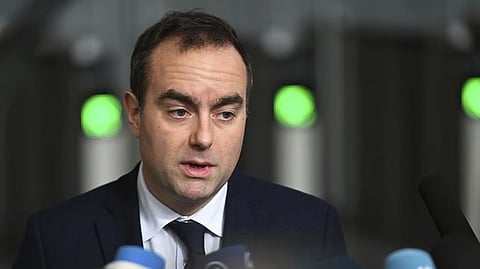

On Tuesday, September 9, 2025, President Emmanuel Macron named his close ally Sébastien Lecornu as France’s new Prime Minister, following the ousting of François Bayrou via a parliamentary confidence vote the previous day. Lecornu, the fifth Prime Minister in two years under Macron’s presidency, steps into a role marked by ongoing political challenges, reported The Indian Express.
In a social media post, Lecornu expressed gratitude for his appointment, stating, “The President of the Republic has entrusted me with the task of building a government with a clear direction: the defence of our independence and our power, the service of the French people, and political and institutional stability.” He added, “I wish to thank him for the confidence he has shown me by appointing me Prime Minister.”
Who is Sébastien Lecornu?
At 39, Lecornu was previously the youngest defence minister in French history and the longest-serving minister in Macron’s government since 2022.
A former conservative, he joined Macron’s centrist Renaissance party in 2017, holding roles such as minister of local government and minister of overseas affairs.
During the 2018 yellow vest protests, Lecornu led the nationwide “great debate” to address public grievances. As defence minister, he spearheaded a €413 billion defence spending package for 2024-30, the largest in half a century, aimed at modernising France’s nuclear arsenal, boosting intelligence, and developing remote-controlled weapons, prompted by Russia’s war with Ukraine.
Macron’s strategy
By appointing a loyalist like Lecornu, Macron signals his commitment to maintaining continuity and pursuing a pro-business budget with austerity measures. However, this decision risks alienating voters, particularly the centre-left, and fueling public discontent, as polls indicate growing frustration with France’s dysfunctional political landscape.
Roots of political instability
France’s political crisis dates back to June 2024, when Macron called snap parliamentary elections after his Renaissance party’s significant loss in the European Parliament vote.
Aiming for “a clear majority in serenity and harmony,” Macron’s gamble backfired, resulting in a hung National Assembly split among three major blocs: the left alliance with the most seats but no majority, the far-right National Rally with the most votes but insufficient for control, and Macron’s weakened centrist coalition.
This fragmentation has made it nearly impossible for any Prime Minister to secure support for passing legislation, including the critical yearly budget. Michel Barnier, appointed in September 2024, was ousted after just three months due to budget disputes.
In early 2025, France’s public debt reached €3,345 billion, equivalent to 114% of GDP, making it the third-highest in the eurozone after Greece and Italy. According to a BBC report, this translates to nearly €50,000 per French citizen, underscoring the economic pressures fuelling political instability.
